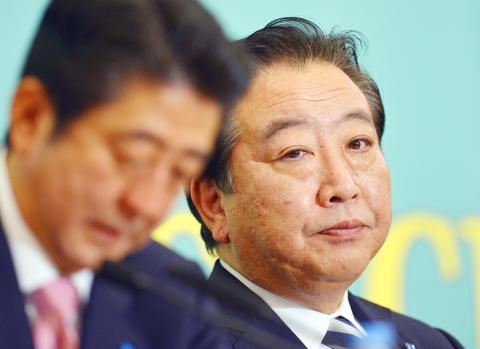Tokyo yesterday approved US$10.7 billion in fresh spending to help boost Japan’s limp economy, just weeks before an election the ruling party is expected to lose.
The ¥880 billion (US$10.7 billion) in spending was more than double a package announced in October as the country gets set for polls that are expected to usher in Japan’s seventh prime minister in six years.
However, the move, which came as official data showed Japan posted a surprise uplift in factory production in October, threatened to trigger vote-buying criticism from opposition lawmakers.

Photo: EPA
The spending will focus on boosting growth in a range of sectors, including healthcare and agriculture, as well as on public works projects following last year’s earthquake and tsunami disaster.
Opinion polls suggest Prime Minister Yoshihiko Noda and his Democratic Party of Japan (DPJ) will be defeated by the country’s main opposition leader Shinzo Abe, who heads the Liberal Democratic Party (LDP).
Abe has vowed to spend heavily on public works and pressure the Bank of Japan into launching aggressive monetary easing measures to boost growth if his party wins the Dec. 16 vote.
The central bank has unveiled two policy easing measures in recent months as its counterparts in the US and Europe launched huge moves to counter slowing growth.
Japan’s economy contracted in the July to September quarter, nudging it toward recession and dousing hopes that the nation had cemented a recovery after last year’s twin disasters, which triggered the worst atomic crisis in a generation.
Masamichi Adachi, a senior economist at JPMorgan Securities, questioned the effectiveness of the latest government stimulus measures.
“While [the package] wouldn’t be a poison, it wouldn’t be a medicine either,” Adachi told reporters.
A glimmer of hope emerged yesterday as official data showed Japan’s factory output rose 1.8 percent in October, the first rise in four months and beating market expectations of a 2.2 percent drop.
Separate figures showed the jobless rate held steady while household spending for the month was better than expected, suggesting a possible improvement in consumer confidence.
The unexpected output jump — and a producers’ survey that forecast a 7.5 output rise this month after a small decline for last month — gave the Tokyo stock market a small boost with the benchmark Nikkei 225 index adding 0.48 percent by the close.
However, the economy ministry doused hopes that the latest data was something to cheer about, saying in a statement that output was on a “downward trend.”
Credit Agricole economist Kazuhiko Ogata cautioned against optimism, saying a sustained recovery would depend on stronger overseas demand for Japanese exports, while producers will have to bring down their built-up inventory.
“A bottom-out of production would be confirmed only after the turn of the year at the earliest,” Ogata said.
Chris Tedder, research analyst at Forex.com in Sydney, said the new figures quelled “some concern of a prolonged slowdown in the world’s third-largest economy.”
However, “overall, the data isn’t enough to turn us away from predicting a recession in Japan this quarter,” he said.
As weak European markets dent demand for Japanese exports, a territorial row over islands in the East China Sea claimed by Tokyo, Taipei and Beijing has also affected the trade balance owing to a consumer boycott of Japanese brands.
Japan’s top three automakers — Toyota, Nissan and Honda — all reported that the row with China has affected sales and profits, with October data on Thursday showing a marked drop output in China, the world’s biggest vehicle market.

In Italy’s storied gold-making hubs, jewelers are reworking their designs to trim gold content as they race to blunt the effect of record prices and appeal to shoppers watching their budgets. Gold prices hit a record high on Thursday, surging near US$5,600 an ounce, more than double a year ago as geopolitical concerns and jitters over trade pushed investors toward the safe-haven asset. The rally is putting undue pressure on small artisans as they face mounting demands from customers, including international brands, to produce cheaper items, from signature pieces to wedding rings, according to interviews with four independent jewelers in Italy’s main

Macronix International Co (旺宏), the world’s biggest NOR flash memory supplier, yesterday said it would spend NT$22 billion (US$699.1 million) on capacity expansion this year to increase its production of mid-to-low-density memory chips as the world’s major memorychip suppliers are phasing out the market. The company said its planned capital expenditures are about 11 times higher than the NT$1.8 billion it spent on new facilities and equipment last year. A majority of this year’s outlay would be allocated to step up capacity of multi-level cell (MLC) NAND flash memory chips, which are used in embedded multimedia cards (eMMC), a managed

Japanese Prime Minister Sanae Takaichi has talked up the benefits of a weaker yen in a campaign speech, adopting a tone at odds with her finance ministry, which has refused to rule out any options to counter excessive foreign exchange volatility. Takaichi later softened her stance, saying she did not have a preference for the yen’s direction. “People say the weak yen is bad right now, but for export industries, it’s a major opportunity,” Takaichi said on Saturday at a rally for Liberal Democratic Party candidate Daishiro Yamagiwa in Kanagawa Prefecture ahead of a snap election on Sunday. “Whether it’s selling food or

In the wake of strong global demand for AI applications, Taiwan’s export-oriented economy accelerated with the composite index of economic indicators flashing the first “red” light in December for one year, indicating the economy is in booming mode, the National Development Council (NDC) said yesterday. Moreover, the index of leading indicators, which gauges the potential state of the economy over the next six months, also moved higher in December amid growing optimism over the outlook, the NDC said. In December, the index of economic indicators rose one point from a month earlier to 38, at the lower end of the “red” light.